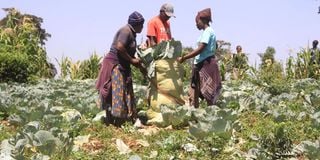Conservation buck stops at Ruto’s door

Farmers harvest cabbages in Mt Kenya Forest where Plantation Establishment and Livelihood Improvement Scheme (Pelis) system of farming is practised in Nyeri County on March 11, 2015.
Nothing more than the recent choice of a burial as a platform by Deputy President Rigathi Gachagua (my condolences to you and the family following the sad news of the loss of your brother at the time of writing this letter) to announce his personal intention to reverse the long-term government policy of maintaining forest reserves in various regions of the country as protected areas.
Forest reserves were launched in Kenya by President Daniel arap Moi, soon after taking over power in 1978, following the death of Mzee Jomo Kenyatta.
President Moi had realised their importance as nature reserves and water towers, which would be important in conserving the country’s wildlife, vegetation and water resources from being depleted by the arid semi-desert environment covering much of the country’s north and northeast regions and quickly spreading in the rest of the country.
Two of President Moi’s successors—President Mwai Kibaki (2002-2013) and President Uhuru Kenyatta (2013-2022)—retained the policy. One can confidently say that at least half of the country’s landmass would by now have been semi-arid land had the two not done that. It would be a great disrespect to these national leaders to suddenly reverse this government policy.
It, therefore, comes as a big shock to any national observer that the DP will, on one of his first acts in office, announce his intentions to reverse all this investment by previous generations of leaders and citizens just to satisfy the ambitions of a small cartel that supposedly want to use forest land for agricultural purposes.
Political ambitions
Who in Kenya plants their maize, beans and potatoes in forests? Certainly not the Kenyans I know. Any serious observer will only conclude that the DP is looking to build up a reserve of resources to fund his future political ambitions. Unfortunately, forest reserve land is one of the few remaining resources available to him for these purposes.
As a top government official, forest reserves are one of the pawns available to him to play his political chess games and he has already started making his plans clear to all.
With all due respect, Mr Gachagua, those reserves are national resources, protected by the laws of the land and maintained for the good of the current and future generations of Kenyans and not to be used for personal gain by leaders. President William Ruto mustn’t allow this to continue, lest we soon have national resources—even game reserves like Tsavo and Maasai Mara—being sold by governors for personal gain. And that will mark the death of our tourism industry.
Mr DP, the ball is in your court to stop this happening and prove that Kenya Kwanza, led by the Ruto administration, is not dead on arrival.
Peter Agak Ayugi, Kilifi




